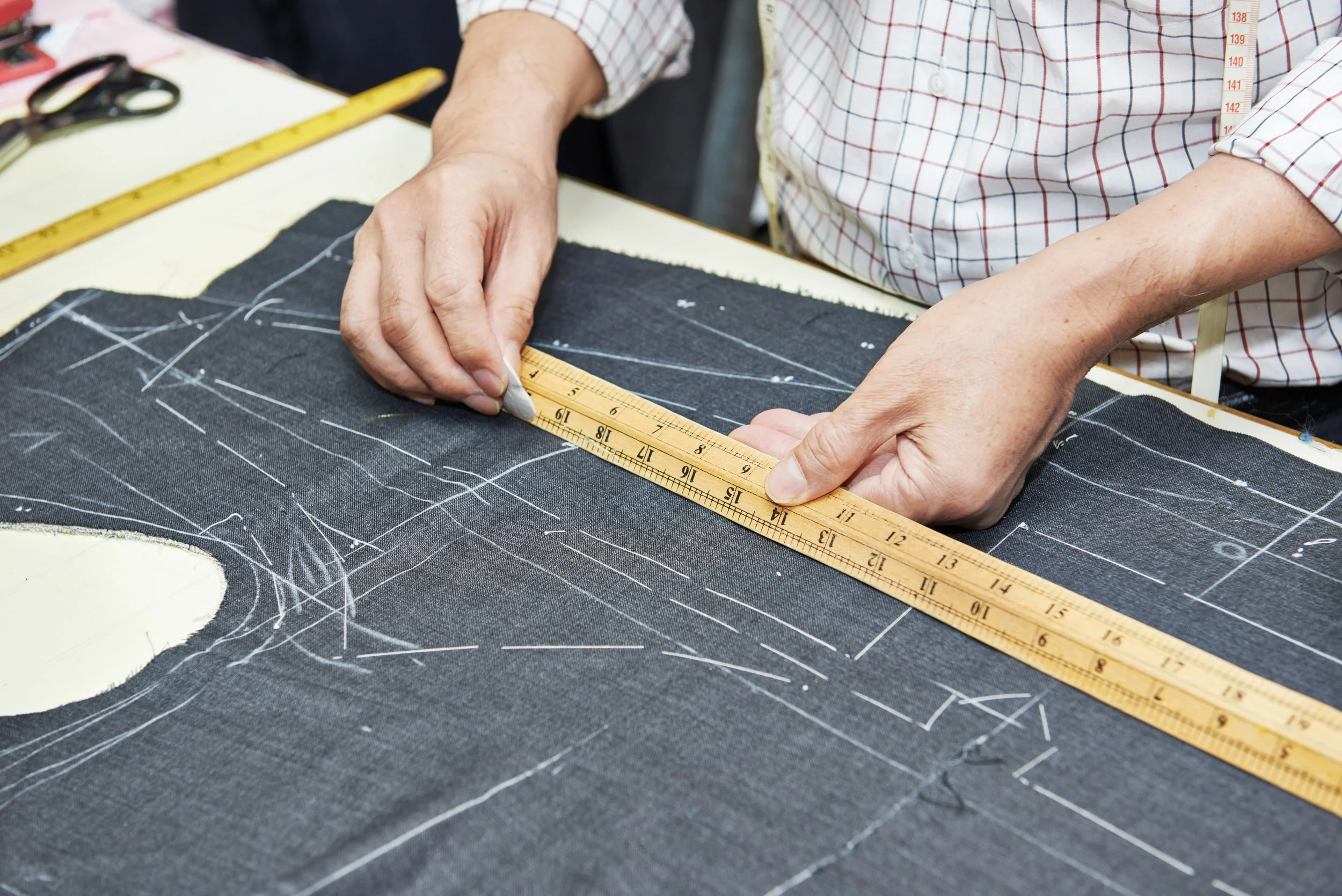FAQ
Q. What is the difference between Bespoke and Made-to-measure?
Made-to-Measure: This form of custom tailoring involves adjusting pre-existing patterns to the clients measurements. This primarily involves adjusting the symmetrical areas such as jacket length, sleeve length, and girth. These limited customizations cannot accommodate for posture, shoulder slope/concavity, or other common asymmetrical differences most bodies have.
Bespoke: This form of custom tailoring refers to the process of creating a unique, original pattern specific to a client’s body structure. Unfortunately, the word “bespoke” has lost the impact it once had in the industry. Most custom clothiers will claim to deliver a bespoke garment, but nearly all of them use a made-to-measure process. Not only do clients choose each and every detail, but each garment is hand-cut, hand-sewn, and suits each individual to exact specifications. With bespoke clothing, our clients are able to see and (most importantly) feel the difference. Bunbury Custom Clothiers is a certified Master Bespoke Clothier and our clients have the option to experience a true bespoke process and product from start to finish.
Q. How long does the process take?
The first appointment takes around 1hr - 1.5hrs. We go through our extensive fabric selection, take 40+ measurements by hand, and walk you through designing the garment.
Our garments have a turnaround time of 4-6 weeks, with some slight variation depending on the season and supply chain. Let us know if you have a “rush” requirement, we can accommodate a 2-3 week turnaround for an additional fee.
Once the garment is complete, we will schedule a final fitting for you to try everything on and ensure a perfect fit.
Q. Do you exclusively make clothing for men?
We make custom clothing for every body! We are happy to work with men, women, transgender, non-binary, and more in the LGBTQ+ community. Our company believes everyone should have an opportunity to look and feel their best in proper bespoke formal wear. We provide styling options beyond the basic traditional options and are happy to work with you to design a piece that fits your personal vision and body type. Our standard style options include suits, blazers, dress pants, skirts, shirts/blouses, tuxedos, overcoats, and professional dresses.
If you are looking to create a unique design outside of the traditional mold, please try to provide 8-10 weeks for turnaround as the garment may require additional time to craft correctly.
Q. Do you only operate in North Carolina?
We work with clients around the world and are not limited to the RDU area or North Carolina. Contact us and we can set up a virtual consultation before scheduling a visit.
Q. How does the package pricing work?
The packages aim to offer potential clients a snapshot of what purchasing custom clothing with us entails. We prioritize transparency by clearly stating the minimum investment required, along with an estimated price range shown during fittings. Frequently, clients choose to upgrade to fabrics beyond the starting price, selecting options with enhanced features like natural stretch, wrinkle resistance, or deeper colors. This is where having a price range becomes especially valuable.
The pricing of each garment is determined by two key factors: the amount of fabric required and the cost per yard of the selected material. This explains why we don't have set prices for each garment category on our website—the listed price of $1,595 for an entry-level suit, for instance, is simply an average. After completing a client’s measurements, we calculate the yardage needed, allowing us to provide an exact cost for their garment.
Q. What fabrics do you carry?
We are proud to provide an extensive fabric selection featuring industry respected mills. These include Dormeuil, Gladson, Holland & Sherry, Zegna, Scabal, Ariston, Piacenza, Cerruti, Carnet, Marzoni, StylBiella, and more.
Q. What is the difference between Fused, Half-Canvas, and FUll Canvas Suits?
The best way you can think of a suit’s canvas is like the frame of a house. It is created in the shape of the suit and is the initial piece of canvas on which the fabric of the suit is stitched onto. This process prevents any deformation or sag to the suit and overtime conforms to the shape of the body of the wearer. A full canvas jacket has the canvas extend all the way down the jackets front, so that every part of the suit can conform to the shape of the wearer and every potential stress point on the jacket holds for longer. The one downside is this does create a slight added weight to the jacket, but the tailored fit you receive is unmatched.
A fused suit on the other hand doesn’t use canvas to create the structure but rather a glued interlining to the wool fabric. Fusing technology has improved dramatically over the years and this method can produce a high quality suit, however when done poorly it is susceptible to stiffness/an unnatural look or fabric ripples in the chest and lapels from the glue wearing down. No matter what however this method is less durable overtime and less breathable.
As the name suggests a half canvas suit meets in the middle of these two methods. The fabric for the chest and lapel pieces are stitched onto a canvas base and the back remains unstructured. This removes the issue of bubbling/lower durability that can occur around the chest and lapels, and provides a breathable finish with a more natural drape. Due to the lower amount of work compared to a fully canvased jacket, you are also able to save on the price while still getting a very high quality fit/look.
